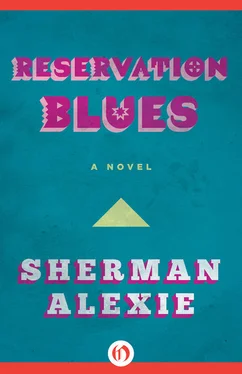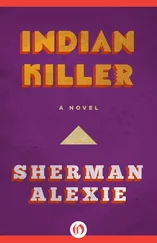Warm enough, Junior said and silenced his siblings with a mean look.
Here’s some food, mother-and-father said, and shoved potato chips and Pepsi through the open window into the arms of their children.
We’ll be out soon, okay? mother-and-father said.
Junior and his siblings watched their parents stagger back toward the bar. Mother-and-father turned and waved. Then they danced a clumsy two-step.
Jeez, Junior said in his dream. They love each other.
Mother-and-father wove their way back inside the bar, and Junior turned back to his siblings.
Make sure everybody gets enough, Junior said.
They ate their potato chips and Pepsi.
I’m bored, his siblings said after dinner, so Junior sang to them.
I’m bored, his siblings said again, and Junior started to cry. He cried as each of his siblings climbed out of the car and ran away on all fours. They ran into the darkness; hands and feet sparked on the pavement. They ran to other reservations and never returned. They ran to crack houses and lay down in the debris. They ran to tall buildings and jumped off. They joined the army and disappeared in the desert. Junior cried until his parents came out of the bar at closing time.
Where is everybody? mother-and-father asked.
Gone, gone, gone, gone.
Mother-and-father cried. Then they drove down the highway and looked for their children.
I don’t mean to say it’s all your fault, mother-and-father said. But it is all your fault.
They drove and drove. Mother-and-father sat behind the wheel and drank beer. When finished, they rolled down the window and threw the empty bottles into the dark. Junior heard them shatter against road signs. He saw the little explosions they made at impact. Impossible reds, impossible reds. He lost count of the bottles.
Ya-hey, Junior called out, but his parents pushed him back.
I don’t want to hurt you, mother-and-father said. But I might hurt you.
Junior leaned back, curled into a ball in the back seat. He heard the road sing under the wheels of the car. He heard his parents’ soft tears and quiet whispers. Then he noticed the car moving faster and faster, his parents’ tears and whispers growing into sobs and shouts.
Wait, Junior said, but the car suddenly rolled. Junior counted the revolutions: one, two, three, four, all the way to twenty. The car came to rest on its wheels, with Junior still tucked into a ball in the back seat. He listened to a faint song in the distance. He heard something dripping in the engine. He heard coughing.
Ya-hey, Junior said as he climbed out of the car and saw his mother-and-father completely still on the grass. He grabbed his parents by the arms and dragged them across the grass. It took hours. He dragged his parents up stairs and into a strange house. It took days. He dragged his parents into a bedroom and laid them down on the bed. It took years. He kneeled at the foot of the bed. He folded his hands to pray.
He opened his mouth, but nothing came out. He strained and strained, his vocal cords ached with the effort, but nothing came out. Then he heard music from the radio beside the bed. He turned up the volume until the walls and bed shook. His parents stared with fixed pupils. They danced on the bed. Their arms and legs kicked wildly, until their fingers locked, and they pulled each other back and forth, back and forth.
Chief WalksAlong hit two quick jumpshots over a seriously handicapped Lester FallsApart, who protected his broken nose with one hand. Officers William and Wilson made baskets, and Samuel ran ragged trying to defend himself against the entire world.
TRIBAL COPS—5
SAMUEL & LESTER—3
“Samuel,” the Chief asked, “don’t you sing pretty good? I might want to hear a few verses of ‘I Fought the Law and the Law Won’ after this game.”
“I don’t know that one. But I know how to sing ‘I Shot the Sheriff.’”
The Chief threw the ball to Art Heavy Burden, who missed a jumper, but the Chief followed the shot and put the rebound back in.
TRIBAL COPS—6
SAMUEL & LESTER—3
“That shot was for every time one of you drunk ass Indians told me I wasn’t real,” the Chief said. “That was for every time you little fuckers think pissing your pants is a ceremonial act.”
“Did you ever drink?” Thomas asked Chess after he came back inside the house. His father still snored on the table.
“No.”
“Not ever?”
“Neither of us ever drank,” Chess said.
“We were afraid of it,” Checkers said. “Even when we wanted to drink, we were too scared, enit?”
Thomas looked at his father on the table.
“Look what it did to my father,” he said.
Chess looked at Thomas, at his father, at both. She saw her father, Luke, in their faces. She missed her father, even after all he had done.
Checkers also saw her father in Samuel’s face, in Thomas’s eyes. She saw that warrior desperation and the need to be superhuman in the poverty of a reservation. She hated all of it.
I’m Super Indian Man, those pseudo-warriors always shouted on the reservation. Able to leap tall HUD houses in a single bound. Faster than a BIA pickup. Stronger than a block of commodity cheese. Checkers tried to ignore them, but the Indian men visited her dreams. Look at my big cowboy hat. Look at my big boots. Look at my big, big belt buckle. Those men, those ghosts, crawled into her bed at night, lifted her nightgown, and forced her legs apart. After they finished with her, those Indian men sat on the edge of the bed and cried. Ha-oh, ha-oh, ha-oh. I lost my cowboy hat. Somebody stole my boots. I pawned my belt buckle. No matter how bad she felt, those tears always moved her heart. She reached for the Indian men in her dreams and held them tightly. Her stomach turned, and she swallowed bile, but she held on.
“I hate this,” Thomas said. “I hate my father.”
“You don’t hate him,” Chess said. “You’re just upset.”
“I hate him,” Thomas said again and squeezed his hands into fists.
A few days earlier, Chess and Thomas had driven to Spokane for a cheap hamburger. They walked in downtown Spokane and stumbled onto a drunk couple arguing.
“Get the fuck away from me!” the drunk woman yelled at her drunk husband, who squeezed his hand into a fist like he meant to hit her.
Thomas and Chess flinched, then froze, transported back to all of those drunken arguments they’d witnessed and survived.
The drunk couple in downtown Spokane pulled at each other’s clothes and hearts, but they were white people. Chess and Thomas knew that white people hurt each other, too. Chess knew that white people felt pain just like Indians. Nerve endings, messages to the brain, reflexes. The doctor swung hammer against knee, and the world collapsed.
“You fucker!” the white woman yelled at her husband, who opened his hands and held them out to his wife. An offering. That hand would not strike her. He pleaded with his wife until she fell back into his arms. That white woman and man held each other while Chess and Thomas watched. A hundred strangers walked by and never noticed any of it.
After that, Chess and Thomas had sat in the van in a downtown parking lot. Thomas began to weep, deep ragged tears that rose along his rib cage, filled his mouth and nose, and exploded out.
“You don’t hate him,” Chess said to Thomas as Samuel Builds-the-Fire inhaled sharply and held his breath too long. They all waited for the next breath. When he finally exhaled loudly, it surprised him to be alive, and he smiled in his sleep.
Читать дальше












